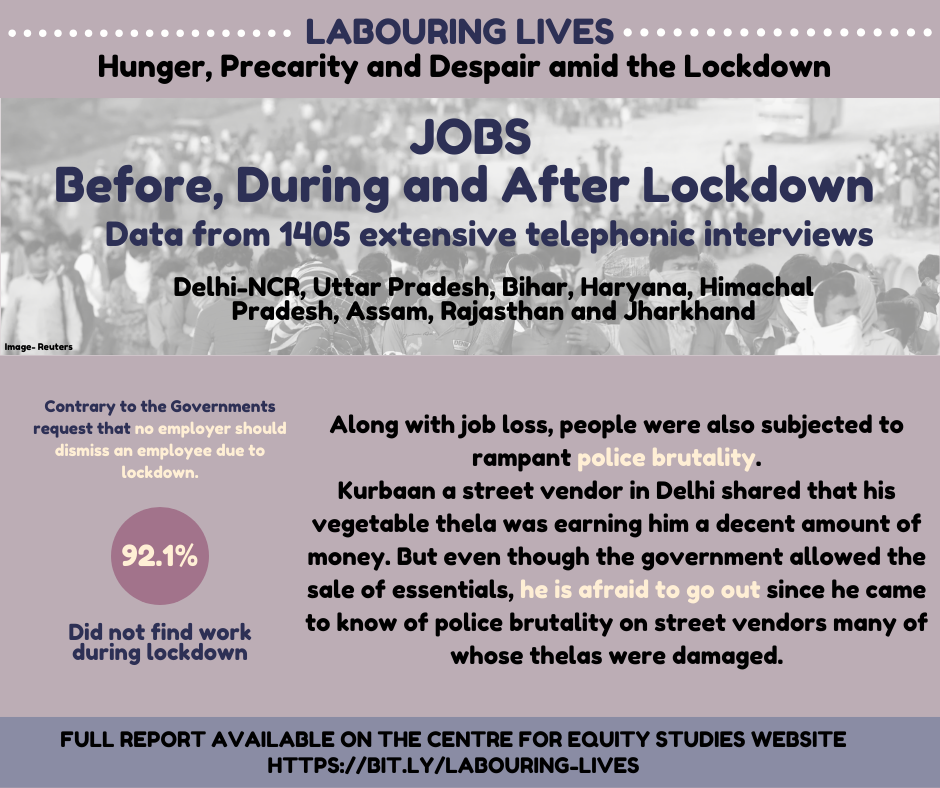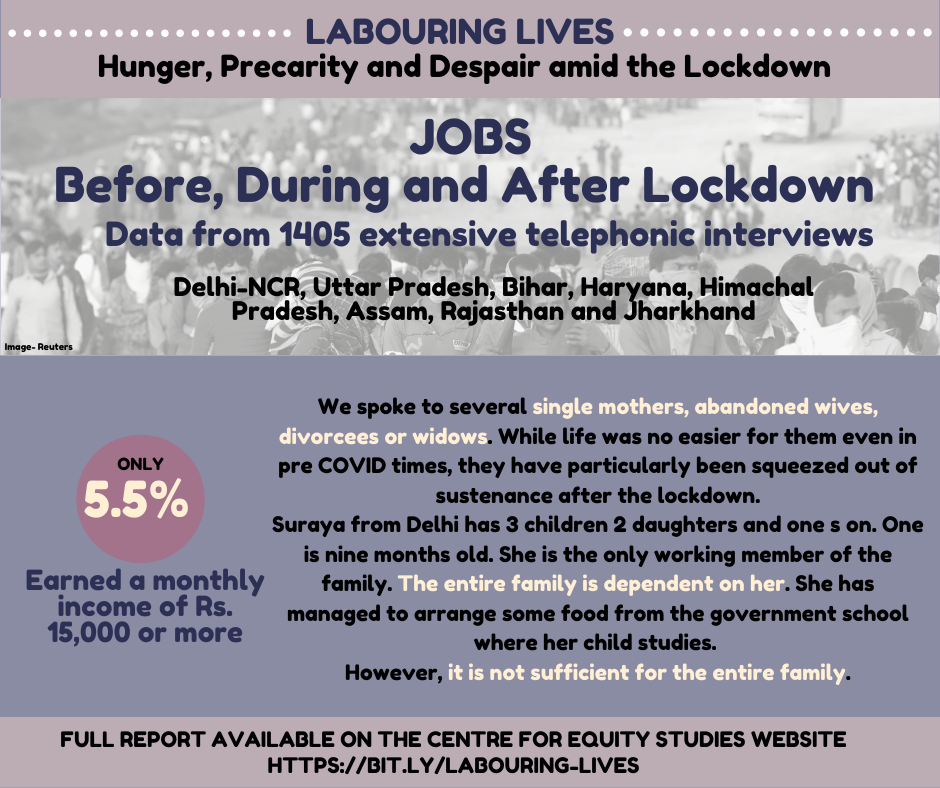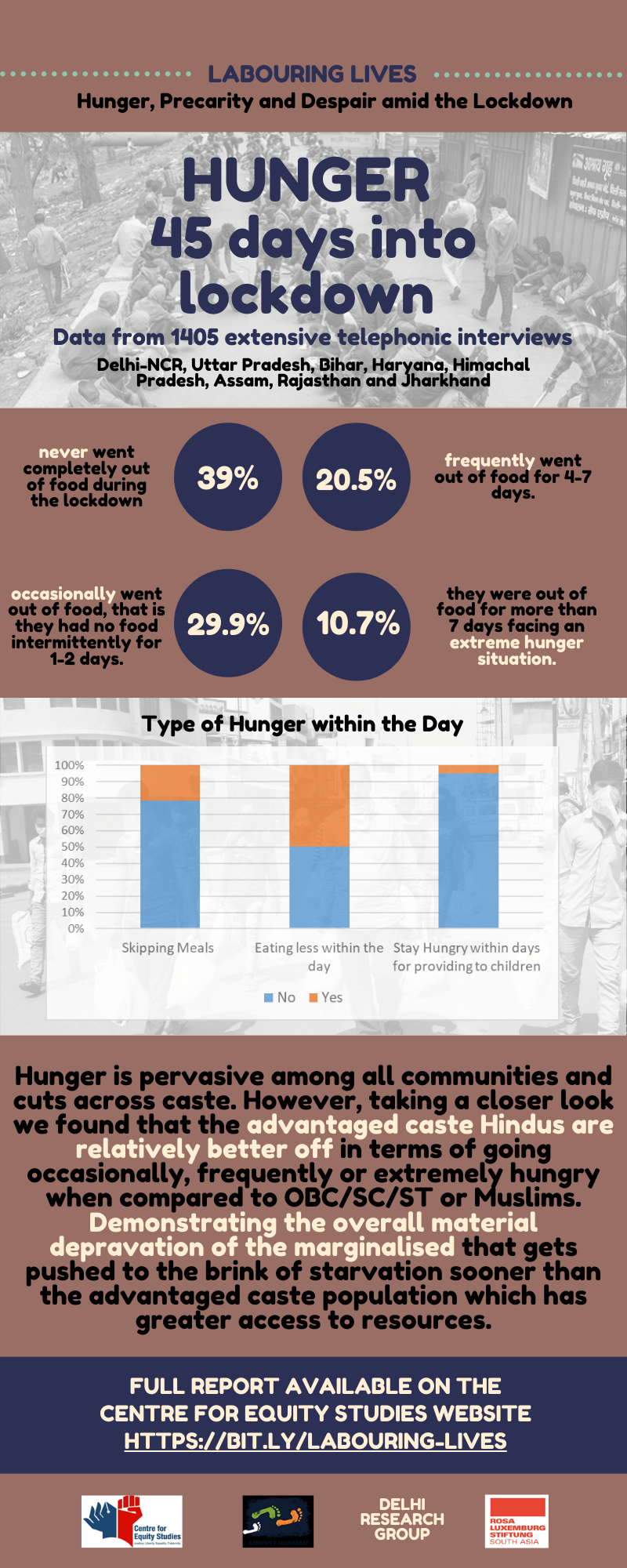Centre for Equity studies and Delhi Research Group conducted a survey among workers on the issues of job loss and hunger during the stringent nationwide lockdown imposed by the Modi Government. The survey is based on 1405 extensive interviews, conducted telephonically, and aims at providing a detailed account of various aspects of the lives and livelihoods of the working population during the nationwide lockdown, focusing particularly on the issues of hunger and job loss. Among the different categories of workers included in the survey were from organised and unorganised sectors.
The study provides detailed analysis of the extent and depth hunger and job-loss faced by the workers and how it varied by income levels (before lockdown), social identities, locations and migration status. Among the various questions that study attempts to answer are- the extent and reach of food relief and the coverage and reach of the social security schemes. Workers perception of job-loss and future employment. These questions were answered by examining the following aspects- job loss during lockdown, post lockdown uncertainties, incidence of hunger, source of relief/support, and indebtedness.

The report titled, ‘Labouring Lives: Hunger and Despair Amid Lockdown’ was released on 19th June. Here is a brief summary of the report:
-
More than 60% of the workers sampled reported that they went hungry for days. The answer varied from one to more than 7 days during the 45 day lockdown.
-
Some of the key findings of the study indicate that-
-
There has been widespread job loss and there is very little difference in job-loss in urban and rural areas.
-
Contrary to the government order requiring the employers to pay wages to the workers, almost 90% workers working under a contractor were not getting paid. For those not working under a contractor, the figure goes up to 94%.
-
With regard to the job prospects post lockdown, 43% respondents were uncertain about the jobs in the future. The report states that the uncertainty of employment is higher among women, OBCs, inter-state migrants, Muslims, dalits and other socially marginalised groups.
-
On the aspect of experiencing hunger, more than 60% reported that they experienced hunger for entire days. Out of which 29.9 % reported they had no food intermittently for 1-2 days. 20.5% people said they frequently went out of food for 4-7 days during the period of lockdown. And 10.7% said, they were out of food for more than 7 days facing an extreme hunger situation.
-
The source of food for the maximum number of people were NGOS, followed by the government initiatives and religious and community organisations. The report states that, “almost all respondents have no access to social security.”

-
Two important points made in the report are-
-
The study indicates that almost all aspects of the lockdown such as job-loss, hunger, uncertainty of future employment, access to relief measures and social security the impact has been different based on gender, caste and religious identities. The report states that “Hunger is pervasive among all communities and cuts across caste. However, taking a closer look we can find that the workers who belonged to the advantaged caste Hindus have suffered less in terms of going occasionally or frequently hungry compared to others”
-
The Ministry of Home Affairs issued an Order 29 March, 2020 mandating all the employers to pay wages to their workers even during the lockdown period. This move was supposed to sustain the workers through the government imposed lockdown. The mandate on the employers was revoked by a subsequent order dated 17th May. The report provides analysis of how this initiative of the government to ensure payment to workers has failed. It states that there has been a push towards hyper-casualization of labour in India which leaves many workers without any identifiable employer, or rapidly changing employer and the meditation of contractors between the worker and the principal employer. The survey indicates that more than 9 out of 10 workers were not paid wages during the lockdown.
The full report is available on the Centre for Equity Studies website here.





